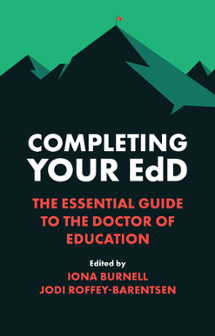
Index
Completing Your EdD: The Essential Guide to the Doctor of Education
ISBN: 978-1-78973-566-6, eISBN: 978-1-78973-563-5
Publication date: 14 September 2020
Citation
(2020), "Index", Burnell, I. and Roffey-Barentsen, J. (Ed.) Completing Your EdD: The Essential Guide to the Doctor of Education, Emerald Publishing Limited, Leeds, pp. 259-263. https://doi.org/10.1108/978-1-78973-563-520201015
Publisher
:Emerald Publishing Limited
Copyright © 2020 Iona Burnell and Jodi Roffey-Barentsen
INDEX
- Prelims
- Introduction
- 1: The Structure of a Professional Doctorate in Education; Why Choose it?
- 2: Your Relationship with Your Supervisor
- 3: Ethics in Educational Research
- 4: Writing the Literature Review
- 5: Developing a Theoretical Framework
- 6: Research Design and Methodological Approaches
- 7: Analysing and Interpreting Data
- 8: Getting Over the Finishing Line
- 9: The Examination Process and Your Viva
- 10: Post Qualification – Now You’re a Doctor, What Next?
- Index